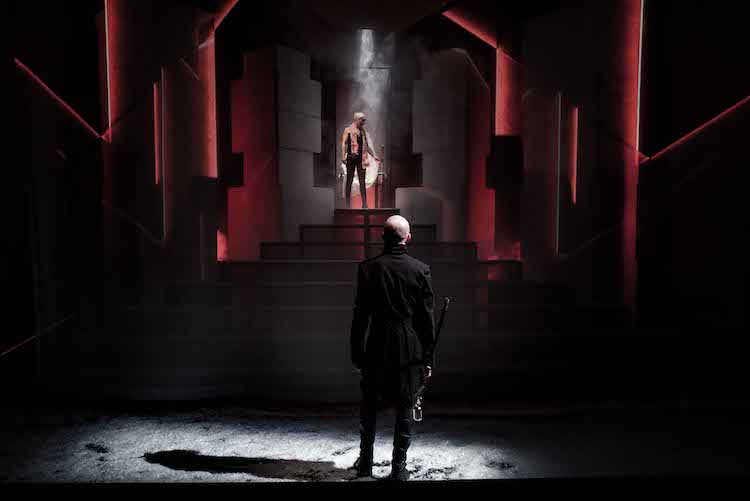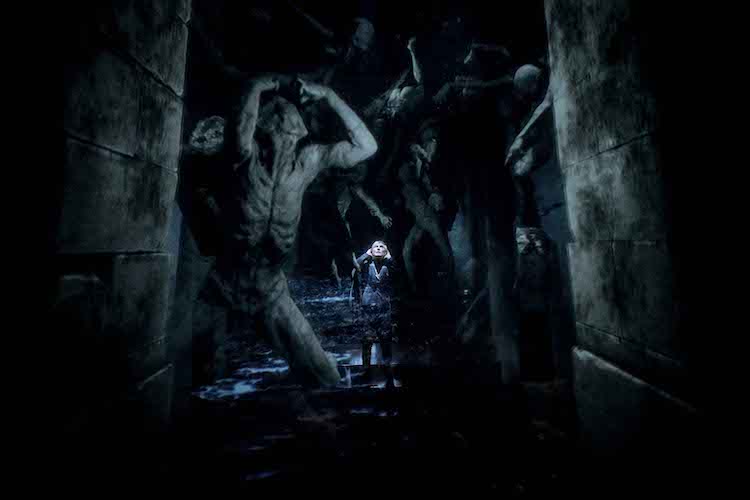Gaële Boghossian and Paulo Correia’s theatre company is renowned for thought-provoking, boundary-pushing productions. But their latest œuvre may be their finest one yet.
Long left to collect dust in European and American theatre archives, Greek tragedies have been undergoing an astonishing revival for the past twenty years. It appears that after decades of vacillating between jarring contemporary works and shallowly entertaining plays, theatre goers have a newly rediscovered appetite for something with more substance and relevance… something that echoes our struggle to cope with society’s ever-increasing violence and its ruthless leaders.
What better source to go to than the great Greek classics that two and a half thousand years ago have already mercilessly exposed the machinations of those in power?
The era of Greek tragedies peaked around 500 BCE, and The Oresteia is doubtlessly its flagship. Aeschylus’ legacy work consists of three distinctly different yet interwoven parts – Agamemnon, The Libation Bearers (aka The Choéphores) and The Eumenides – and is the only trilogy that has survived through our times.
Never one to shy away from complex content, Collectif 8, the house company of Antibes-based Théâtre Anthéa, has revived Aeschylus’ texts two and a half thousand years after they were first performed. Why? “Because they speak not only to us but directly OF us – men, women, citizens of the 21st century,” the company’s co-founder Gaële Boghossian explains. And in Collectif 8’s extraordinary adaptation L’Orestie, it becomes the timeless masterpiece that the poet must have intended it to be.
If you have followed Collectif 8’s work over the past ten years, you know that Gaële Boghossian is a fearless fighter for exactly these topics. A ferocious reader, she devours complex classic literature to find parallels to the world we live in. She has proven her immense intellectual capacity by expertly adapting works as diverse as Goethe (Faust), George Orwell (1984), Lewis Carroll (Alice), Kafka (Le Chateau), Alexandre Dumas (Monte Cristo), Molière (George Dandin) and many more. She lays bare the flaws of modern society by reinterpreting great literature for our times, and points the finger at inequality, corruption, and abuse of power – topics that were as pertinent hundreds and thousands of years ago as they are today. The condition of women also comes up time and again.
But this time, Gaële has surpassed herself. In this unapologetically contemporary version, she teases the subtlest nuances from the original text and throws them under the glaring spotlight of modern society for all to examine. The central figure and overarching theme of all three tragedies is Clytemnestra. The complexity of her character is striking in its timelessness. She is free-spirited, an egalitarian, and a figure head of protests, yet only holds an inferior rank in the patriarchal society – representative of all women, past and present. Her trial as her husband’s killer echoes a real societal issue of the unequal treatment of crime, depending on whether it was committed by a man or a woman. Beyond this vision of the archetypal woman, the play has a deep political in regard to the metamorphosis of our own societies. It questions the foundations of our world, our justice and our democracy.
Provocation. Confrontation. A woman who is mother and murderess, angel and demon, betrayed woman and avenger alike… this text is challenging for the audience as it holds up a mirror to one’s own judgments. But although reminiscent of Edgar Allen Poe in its depth and darkness, it never veers outside the guardrails of Gaële’s innate class and poetry. Without losing one iota of the original’s impact, she turns its density into an elegant abstract that is readily accessible to today’s audience.
— Gaele Boghossian and Paulo Correia
It is Gaële Boghossian herself who steps in the role of Clytemnestra – and does so magistrally well. The Greek heroine becomes a fierce 21st century badass that drips with raw power and sex appeal, and suffers no nonsense. And yet, there is a fragile and vulnerable interior underneath the hard shell…
Gaële is supported to perfection by Damien Rémy and Matthieu Astre whose strong performances stand up to her powerful presence – not an easy feat by any means.
In typical Collectif 8 style, stage play and videography melt into one. The creation of the video universe is particularly challenging as the complex text relies primarily on the actor. And here, as always, all kudos go to the brilliant Paulo Correia whose artistic wizardry borders on genius, and who also doubles as artistic director. With his impeccable sense for theatricality, he creates video-projected palaces, interiors, dreamscapes, and nightmares that not only visually complement the actors but also forcefully pull the audience into a vortex of adrenalin-driven emotions. It’s what Picasso, Dali, and Munch would have come up with, had they collaborated on videography.
The stark black and white contrasts and lightning-fast 3-D effects of erratic movement emphasize the drama played out by the stage actors and are still amplified by Benoît Berrou’s musical score which complements the immersive journey into the depths of Greek tragedy. And Tiphaine Bureau’s mastery of the lights creates moodscapes that leave no one unmoved.
But inmidst of this turmoil of heavy emotions, something magical happens. A voice rises – the gentle, sweet and pure voice of a young girl who narrates the context, sometimes poetically, sometimes cynically, but always in a way that creates the reassuring sense that not every angel has fallen. And that voice belongs to none other than to young Adèle, Gaele’s and Paulo’s daughter who has clearly inherited her parents’ immense talent.
No one will leave the theatre without being emotionally stirred by Collectif 8’s L’Orestie. This monumental chef d’oeuvre is a worthy celebration of the tenth season of Théâtre Anthéa, the second House in France. But it also deserves a place in the leading theatres of Paris, London and New York – and what a treat it would be to see it there!
Currently, no new dates are announced; follow Collectif 8 for news and updates.
I needed a voice that would not betray me in what I wanted to express. A voice that questions more than it claims. A voice of reason that transmits to the public the paradox of a reflection rather than a harsh judgement of right and wrong. Do we judge a man and a woman equally when faced with a crime? I came to think that the answer is “no”, and I then asked myself another question: “Why?” The beginning of a response to this internal questioning seems to me in our DNA.
— Gaële Boghossian
Lead image courtesy Collectif 8; all other photos as credited




Leave a Reply